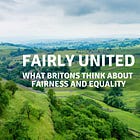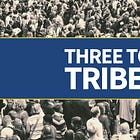Do people care more about inequality or unfairness?
Evidence suggests that the vast majority of Britons are worried about inequality, but often they are even more exercised about unfairness
Last Thursday we co-organised a conference in the House of Commons, with the APPG on Inclusive Growth and the Policy Institute at King’s College London, about solutions to inequality. The conference, Towards the Manifestos, unveiled the results of new polling on public attitudes to inequality and to a wide range of potential policy solutions, and explored whether and where there might be an emerging consensus on those solutions that could unite a broad cross-section of the public, as well as experts and political parties. You can read about the polling on the conference webpage (with a link to the PDF report and some interactive charts), and we’ll publish a conference write-up in the coming weeks.
In my conference talk, I argued that there is a growing consensus of concern about inequality, with reference to the polling published on the day, as well as to previous polling (such as last week’s report, Fairly United, with Ipsos polling finding that 85% of Britons are concerned about inequality).
I ran through some of the reasons for this growing concern about inequality, including the fact that some people are less concerned about inequality in principle but are worried about the consequences of inequality, such as the impact on our politics and on the fairness of our tax system (as our report Three Tory Tribes? found last month).
And I spoke about the potential for harnessing that consensus by talking about the need to blend individual responsibility with reducing inequality, building on More in Common’s insight that “there is a consensus on the need to address inequality that transcends political divisions and reflects majority views... what is striking is how much common ground there is between those who emphasise systemic inequality and those who emphasise personal responsibility”. It is hard to exercise responsibility when many people face almost insurmountable barriers to opportunity. We have an opportunity to reclaim equality of opportunity. This is not just the superficial notion of removing the most obvious barriers - discrimination - but substantive equality of opportunity, the John Rawls notion of fair equality of opportunity.
The challenge, as one of the conference delegates rightly pointed out, is that while a super-majority of Britons are concerned about inequality, it is not the top priority for most of them. The Ipsos research cited above found that 6% say inequality is ‘the single most important problem’ in Britain, and 36% think it is ‘one of the most important problems’. 43% think inequality is ‘important, but not the most urgent problem’.
But here, too, is an opportunity - because some of the ‘higher-salience’ issues that many people see as more important or urgent are, to an extent, consequences of inequality. The cost-of-living crisis (exacerbated, but not caused, by inflation), with its roots in systemic housing, employment and social security issues, is just one example.
In fact, many of the issues that get people most worked up are caused by inequality, but can also be described in terms of an absence of fairness. We can identify these for each of our five Fair Necessities (and we put some hard numbers on these issues in last year’s Fairness Index):
Fair essentials: Many people are increasingly unable to afford the basics (food, energy, housing, childcare)
Fair opportunities: Opportunities to flourish are not fairly distributed, with success more down to luck than effort
Fair rewards: The social contract has broken down, with an increasingly tenuous link between hard work and decent rewards
Fair exchange: Public services are crumbling, while some of the wealthiest in society aren’t paying their fair share of tax
Fair treatment: Some people seem to play by a completely different set of rules than the rest of us
These concerns around fairness unite people from across the political divides. The consensus for change can be built around fairness. We should be clear that reducing inequality is a necessary condition for building a fair society, but we might not always want to lead on inequality (or equality) in our messaging.







At the basic level, we cannot all be equal because of natural circumstances, but we can all be fair. The problem with fairness in these times is that many of the powerful have attained too much power and are using it for self-serving purposes. They think that 'throwing crumbs' to the masses will keep people quiet, while they carry on ransacking our planet and abusing their powers. A lot of people have been impressed by seeing this and have come to the conclusion that selfishness is the way to go. Therefore, many people of good character have been left behind. However, there are signs that change is already coming into being, mainly through the young. It just needs us all to join in the general swell for the good of our planet and its lifeforms.